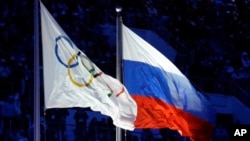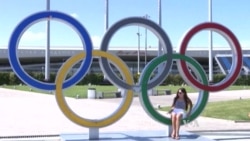The International Olympic Committee (IOC) has decided against banning all Russian teams from competing in next month's Rio Olympics over allegations of an elaborate doping scheme.
Speaking Sunday, IOC President Thomas Bach said the committee stopped short of a collective ban in order to protect the rights of individual Russian athletes who have not used illicit drugs to gain advantage in international competition.
"It's fine to speak about 'collective responsibility' and 'we are banning everybody,' but at the end of the day you have to be able to look into the eyes of the individual athlete concerned by your decision," Bach said.
But the IOC also stressed that the drug testing records of all Russian athletes will face heavy scrutiny in all of the 28 summer events set to begin August 5 in Rio de Janeiro.
In Moscow Sunday, Russian Sports Minister Vitaly Mutko voiced relief that the IOC did not impose the countrywide ban called for last week by the World Anti-Doping Association in a wide-ranging report spawned by a Russian whistleblower.
"In general, we are very grateful to the International Olympic Committee for today's decision," Mutko said, adding that he believes it was "taken in the interests of the unity of world sport and the unity of the Olympic family."
A scathing WADA report issued last week said more than 30 Russian sports had gained advantages from government backed schemes to manipulate anti-doping rules.
Lead WADA investigator Richard McLaren said evidence showed a Moscow laboratory "operated for the protection of doped Russian athletes, within a state dictated failsafe system."
The WADA also said it was "inconceivable" that Mutko did not know about those deceptions.
The WADA probe was triggered by information provided to the New York Times earlier this year by former Russian Anti-Doping Laboratory head Grigory Rodchenkov. Rodchenkov told the newspaper that dozens of Russian athletes used performance enhancing drugs in the 2014 Sochi Winter Olympics, with the approval of national sports authorities.
Both Mutko and Russian President Vladimir Putin later sought to discredit Rodchenkov, with Putin saying last week that the allegations contained in the WADA report "are built on the testimony of one -- a person with a scandalous reputation."
Putin also noted that much like the Soviet and American boycotts of past Olympics, politics was again at the forefront of the current scandal.
Despite Putin's accusations, WADA investigator McLaren characterized Rodchenkov's allegations as "widely credible."














